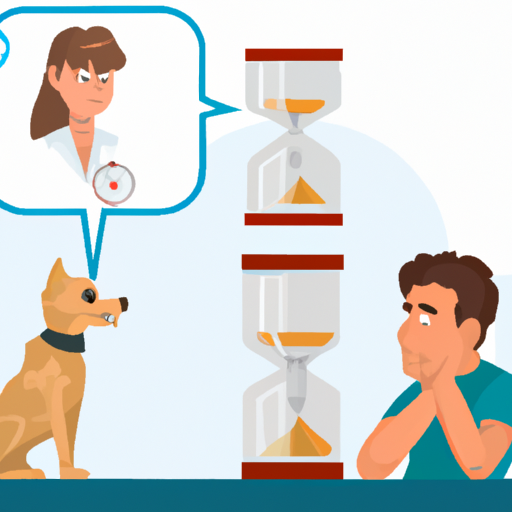Salt is a staple in many of our favorite foods. It’s also a common ingredient in many of the treats and foods we give our beloved pets. But did you know that too much salt can be dangerous, even fatal, to dogs? Salt poisoning, also known as sodium ion poisoning, is a serious condition that can affect dogs who consume too much sodium. Understanding the signs, symptoms, and treatment options for salt poisoning can help you keep your furry friend safe and healthy.
Table of Contents
- Understanding Salt Poisoning in Dogs
- Symptoms of Salt Poisoning
- How Long Does Salt Poisoning Last in Dogs?
- Treating Salt Poisoning
- Preventing Salt Poisoning
- Frequently Asked Questions
Key Takeaways
- Salt poisoning is a serious condition that can be fatal if not treated promptly.
- Symptoms of salt poisoning can include vomiting, diarrhea, seizures, and even coma.
- The length of time salt poisoning lasts in dogs depends on the severity of the poisoning and the treatment provided.
- Salt poisoning can be prevented by monitoring your dog’s diet and ensuring they don’t have access to high-sodium foods or substances.
Understanding Salt Poisoning in Dogs
Salt poisoning occurs when a dog consumes a large amount of sodium. This can happen if a dog eats table salt, drinks seawater, or consumes a food or substance with a high sodium content. The high sodium levels interfere with the dog’s normal body functions, leading to a range of symptoms and potential health problems.
When sodium levels in a dog’s body become too high, it can cause cells to malfunction. This can lead to brain swelling, kidney damage, and other serious health issues. If left untreated, salt poisoning can be fatal.
Symptoms of Salt Poisoning
The symptoms of salt poisoning in dogs can vary depending on the amount of sodium consumed and the dog’s overall health. Common symptoms include:
- Vomiting
- Diarrhea
- Increased thirst and urination
- Weakness and lethargy
- Seizures
- Coma
If you notice any of these symptoms in your dog, it’s important to seek veterinary care immediately. The sooner treatment is started, the better the chances of recovery.
How Long Does Salt Poisoning Last in Dogs?
The length of time salt poisoning lasts in dogs depends on the severity of the poisoning and the treatment provided. In mild cases, symptoms may subside within 48 to 72 hours of treatment. In more severe cases, it can take several days or even weeks for a dog to fully recover.
During the recovery period, it’s important to monitor your dog closely and follow all veterinary instructions. This can include providing plenty of fresh water, feeding a low-sodium diet, and administering any prescribed medications.
Remember, recovery times can vary and each dog is unique. Always consult with your vet for the most accurate information.
Treating Salt Poisoning
Treatment for salt poisoning generally involves addressing the immediate symptoms and restoring the dog’s sodium levels to normal. This can involve intravenous fluids, medications to reduce brain swelling, and supportive care to manage symptoms.
In cases where salt poisoning is caused by a specific food or substance, it’s important to remove that item from the dog’s environment. For instance, if your dog got into a bag of salty snacks, you’ll want to make sure those snacks are kept out of reach in the future.
Preventing Salt Poisoning
Preventing salt poisoning in dogs involves careful monitoring of their diet and environment. Here are some tips:
- Avoid feeding your dog foods high in salt. This includes many human foods and snacks.
- Be cautious with products like play dough, de-icing salts, and certain household cleaners, which can contain high levels of sodium.
- Provide plenty of fresh water for your dog at all times.
- If you live near the ocean, prevent your dog from drinking seawater, which is high in salt.
By keeping these tips in mind, you can help protect your dog from the dangers of salt poisoning.
Frequently Asked Questions
Q: Can dogs eat salt?
A: While dogs need some sodium in their diet, too much salt can be harmful. It’s best to avoid feeding your dog salty foods and to monitor their diet closely.
Q: What should I do if I think my dog has salt poisoning?
A: If you suspect your dog has salt poisoning, seek veterinary care immediately. The sooner treatment is started, the better the prognosis.
Q: How can I prevent salt poisoning in my dog?
A: Prevention involves monitoring your dog’s diet and environment to ensure they’re not consuming too much sodium. Avoid feeding your dog salty foods and be cautious with products that contain high levels of sodium.
This comprehensive guide should help you better understand salt poisoning in dogs, its symptoms, treatment, and prevention methods. For more dog health-related articles, check out these posts on dog nutrition, common dog illnesses, and dog care tips. Remember, the health and happiness of your furry friend is in your hands.



